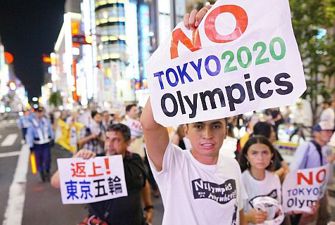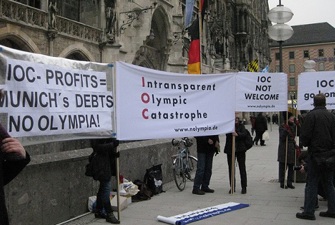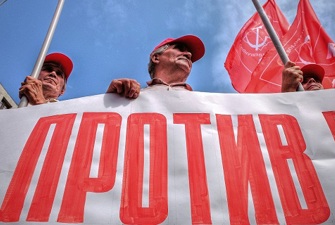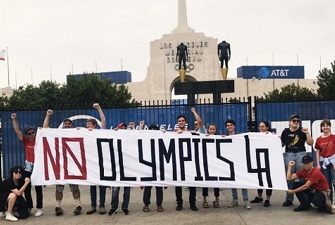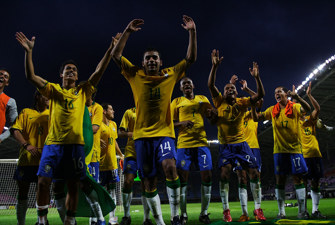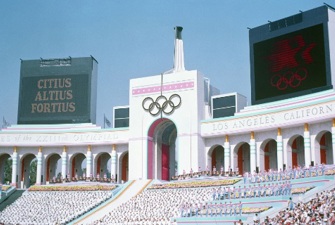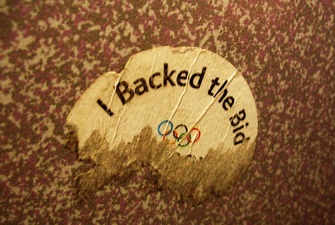Hamburg’s bid for the 2024 Games: Political misconceptions of citizens’ concerns
Through an evaluation of Hamburg’s referendum for the 2024 Games, this third article in a series about civil society, contestation, and the Games examines the role of citizen participation and discusses some of the reasons why the NOlympia campaign gained so much resonance in the city and outside Germany.
In 2014, Hamburg tried to become an Olympic candidate for the third time. Also for the third time, the local bid promoters never even got to submit an application to the IOC. While various reasons played a role in each trial, they mirror a weak public support for hosting the global mega-event. This became particularly obvious with the referendum for the 2024 bid.
Leading local politicians and prominent promoters had been sure of winning the referendum. But Hamburg’s citizens voted against it. With their vote, they unambiguously expressed their disagreement with the present style of glittering, but harshly elitist urban policymaking. This style does not simply misunderstand urban citizens, but more willfully misconceives the concerns of people living in the city.
We want to highlight two topics: the role of citizen participation in bidding for a mega-event and the potential of activist research in opposing event-led urban development. We both evaluated Hamburg’s bid plans as urban geographers and we both were initial members of NOlympia Hamburg, the local anti-Olympic activist group.
We thus write the following essay from a critical point of view as concerns mega-events and its effects on the people living in the respective place. But as citizens actually had a voice in the bid process and as they used it to contest entrepreneurial policies, we basically want to state: The attempt to bid for the Olympic Games failed, but the urban politics made by citizens did not. They used the public awareness for the city’s future and the critique of entrepreneurial urban policy to discuss alternative futures for all citizens beyond mega-event flagship projects.
A brief history of Olympic bids in Hamburg and the role of global attention
Hosting the Olympic Games seems to be appealing to Hamburg’s city mayors: In the early 1990s Henning Voscherau prepared a bid for the Games in 2002, but deferred to Berlin, which wanted to present itself to the world as a unified city.
In 2002, the government of Ole von Beust started the next attempt for the 2012 Games, but lost the inner-German competition against Leipzig – a city in Eastern-Germany that generally was in focus for a stark entrepreneurial development. And again in 2014, then Mayor Olaf Scholz was convinced that hosting the Summer Games in 2024 would be the opportunity that people all over the world will know Hamburg, “also without adding Germany in brackets” – a saying the Scholz again and again repeated.
Desire for global attention was at the heart of all three attempts for a successful Olympic bid. The idea and hope is that for many years, international media would keep an eye on the city of Hamburg, with an incredible intensity during the Games themselves. The actual goal was to become more popular than Berlin and Munich and to play in one league with global cities like London or Sydney. On an indirect level, the global attention attributed to the bid serves as vehicle to receive investments and funds on the national and subnational scale. By creating media pressure, the bid was a means to raise the federal public and local private investment into the local transport, sports, and security infrastructure.
The economic growth facilitated through global attention therefore eventually aimed to change the city – its physical appearance, its power relations, its political landscape, its culture. That is why people’s opinion on hosting the Olympics is extremely important in a double sense: as persons most affected and as persons whose approval is needed for a successful bid. In 2014, the latter was sought through a public referendum – initiated by the local government itself (a novelty in local policy).
The referendum and the role of enthusiasm
Participation was a promise at the heart of the Hamburg 2024 Olympic narrative. The promise materialized through two instruments: public workshops on key topics (such as sports venues or mobility) and a referendum that should decide whether Hamburg eventually bids for the 2024 Summer Games or not.
Both instruments allowed the Olympic promoters – from politicians, local entrepreneurs and sports lobbyists to the media – to continuously call the planned bid into the citizens’ minds and advertise its potentials. The city was not only plastered with posters, but its official letters included the Olympic Flame – Hamburg’s logo for the bid – in their footers. All this aimed at fueling public enthusiasm for the Games that was needed for both winning the referendum and later for convincing the IOC of Hamburg’s commitment to become a host city.
Yet, the promise of participation did not prove successful. The public workshops were basically information events where people’s opportunity to participate was narrowed down to asking questions and writing down ideas on sticky notes. The promise to let ‘ordinary’ citizens influence far-reaching and expensive plans was obviously a fake. And being confronted with massive Olympic advertising while experiencing the pressure of rising rent and already intensive tourism in their daily lives led many people doubt the positive effects of hosting expensive and shiny Olympic Games.
The consequence was a disapproval of the bid in the referendum on November 29, 2015, as 51.6 % of the votes opposed the plans for a 2024 bid.
NOlympia & Co: struggling for another city
After the local government had publicly announced to apply for the Olympic Games 2024 in 2014, a group of right-to-the-city activists organized a discussion series called “Bread and Circuses. For example: London, Rio de Janeiro, Hamburg” in late summer of the same year. This was a starting point to unite expertise on IOC mega-events and the festivalisation of urban development. Soon after the official start of Hamburg’s Olympic bid campaign the anti-Olympic committee NOlympia was initiated with several working groups. The first meeting in April 2015 was followed by monthly meetings with around 50-100 participants.
From the outset, NOlympia aimed to not only oppose the mega-event, but to campaign for a better future for Hamburg. The slogan was: “Something better than Olympic Games!” The local media overwhelmingly supported the pro-Olympic coalition. The main local newspapers (Hamburger Abendblatt, Die Welt, Hamburger Morgenpost) published daily Olympic Games pages with enthusiastic reports and interviews. Local TV stations broadcasted background documentaries and discussion rounds populated exclusively by Olympic bid supporters. The main objective of the NOlympia media campaign thus was to deconstruct Hamburg’s Olympic narratives and to inform Hamburg citizens about the actual costs of Olympic finances, the anticipated traffic chaos, surveillance technologies, long term effects on costs of living and the unsustainability of Olympic legacies.
Additionally, NOlympia published a “who is who” of the main protagonists of Hamburg’s Olympia-campaign in order to unveil opportunistic support of the premium promoters like the CEO of German’s largest department store operator (ECE, Otto group), the German planning company that develops mega sport sites all over the world (Albert Speer & Partner) or a prominent advertising agency (Jung von Matt).
NOlympia summarized their arguments against the Olympic bid and for a better urban development in the resolution “Stop Olympic Madness!”, envisioning inclusive sport sites for all, social housing, an open city and an urban policy for the concerns of the inhabitants.
NOlympia activists were not only present on social media, but also in the streets. For example, NOlympia arranged decentral rallies in order to bring their knowledge into the neighborhoods; and they participatively organized public events with the neighbors of the projected main Olympic site – two working class, migrant quarters – in order to demonstrate material effects of the Olympic stadium, the Olympic swim stadium and the Olympic village on its urban surrounding.
Activist research as part of the anti-bid campaign
Academic activism in Hamburg was mostly pursued by social scientists, urban planners, and geographers (economists were more involved in pro-Olympic-coalition). One key outlet was a manifesto, published one month before the referendum. It pointedly hinted at ecological, social and economic risks of Olympic Games in the given format of the IOC and recommended to vote against the Hamburg bid.
The local government was very upset with this intervention of the Hamburg urban studies community. From that point on, the authors of the manifesto were still not invited to events of the local government, but to public discussion events hosted by institutions that were not part of the Hamburg Games campaign (like the universities or sport clubs) and could fairly balance pro and contra arguments regarding the planned 2024-bid.
Until the evening of the referendum, absolutely nobody expected a majority of votes against the Hamburg bid – not even the NOlympia-activists. The public visibility of the pro-Olympic coalition was too prominent. Instead of acknowledging citizens‘ concerns and reflecting the risks of hosting Olympic Games, Olympia proponents and local media blamed NOlympia-activists for the lost chance of an accelerated urban development and for the missed opportunity of sports promotion.
Conclusion
Even now, NOlympia activists receive interview and information requests from all over the world. Enthusiasts for mega-events want to know why the majority of citizens voted against a Hamburg bid. They want to decode the innovative protest tactics for their own successful referendum without any relevant opposition. This again shows: the enthusiasts only view the opposition as a tactical concern, and do not consider opponents’ alternative ideas about a city for all.
The NOlympia campaign was a temporary peak of protests against entrepreneurial urban policy – and a resounding victory. The ideas for a better city, however, are followed up on and NOlympia-activists from Hamburg still support activists in other Olympic bid cities around the world. Compared to most of these cities, we learned that Hamburg has a special tradition of protest and engagement. Hamburg has a strong and diverse right-to-the-city movement with a fruitful collaboration between radical and more moderate activists. Since the early 1980s, Hamburg had experienced a lot of longstanding social conflicts around gentrification, appropriation and eviction.
On this ground, an effective opposition against an elitist and exclusive mega-project like the Olympic Games could emerge rapidly. Furthermore, the Olympic campaign coincided with the so called “summer of refugees” that received public attention in the summer of 2015. The city administration had to organize accommodation and logistics for thousands of refugees and many citizens supported this effort. That meant that also the right-to-the-city-movement worked on two different angles: one larger group was engaged in refugee solidarity work and a smaller group of around 20 activists built the core group of NOlympia-activists.
The Olympic bid was not the first and not the last mega-event in Hamburg. The engagement for a right to the city and a positive living opportunity for every inhabitant of Hamburg is a continuous struggle and not a temporary phenomenon.
The euphoria of the surprisingly-won referendum did not last. After some months of rest, the right-to-the-city movement mobilized again to contest the next mega-event in Hamburg: the G20 summit. For this event, most of the surveillance infrastructures which were planned for the Olympic Games were implemented. The protest against this mega-event mobilized thousands of people and was the next example for local and transnational collaborations of activists fighting for a more just urban and global future.
